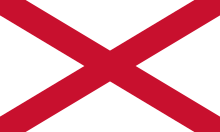
Back Anglo-Iere Afrikaans أنجلو إيرلنديين Arabic Anglo-Irlandés Spanish Angloirlantilaiset Finnish Anglo-Irlandais French Angla-Éireannach Irish Anglo-Yernee GV 앵글로아일랜드인 Korean Anglo-irsk NB Angloirländare Swedish
 St Patrick's Cross is often seen as a symbol of the Anglo-Irish. | |
| Regions with significant populations | |
|---|---|
| Northern Ireland | 407,454[1][2] (Northern Irish Anglicans) (Northern Irish Methodists) (Other Northern Irish Protestants) |
| Republic of Ireland | 177,200[3] (Irish Anglicans) (Irish Methodists) (Other Irish Protestants) |
| Languages | |
| Standard English, Hiberno-English, Northern Ireland Sign | |
| Religion | |
| Anglicanism (some Methodist, Catholic or other Protestant) (see also Religion in Ireland) | |
| Related ethnic groups | |
| English • Scots • Irish • Anglo-Normans • Anglo-Saxons • Ulster Scots • Ulster Protestants • Welsh | |
Anglo-Irish people (Irish: Angla-Éireannach) denotes an ethnic, social and religious grouping who are mostly the descendants and successors of the English Protestant Ascendancy in Ireland.[4] They mostly belong to the Anglican Church of Ireland, which was the established church of Ireland until 1871, or to a lesser extent one of the English dissenting churches, such as the Methodist church, though some were Roman Catholics. They often defined themselves as simply "British", and less frequently "Anglo-Irish", "Irish" or "English".[5] Many became eminent as administrators in the British Empire and as senior army and naval officers since the Kingdom of England and Great Britain were in a real union with the Kingdom of Ireland for over a century, before politically uniting into the United Kingdom of Great Britain and Ireland in 1801.
The term is not usually applied to Presbyterians in the province of Ulster, whose ancestry is mostly Lowland Scottish, rather than English or Irish, and who are sometimes identified as Ulster-Scots. The Anglo-Irish hold a wide range of political views, with some being outspoken Irish Nationalists, but most overall being Unionists. And while most of the Anglo-Irish originated in the English diaspora in Ireland, others were descended from families of the old Gaelic nobility of Ireland.[6]
- ^ "Census 2011: Religion: KS211NI (administrative geographies)". nisra.gov.uk. Retrieved 11 December 2012.
- ^ "Census 2011: Key Statistics for Northern Ireland" (PDF). nisra.gov.uk. Retrieved 11 December 2012.
- ^ "8. Religion" (PDF). Central Statistics Office. Retrieved 30 October 2018.
- ^ The Anglo-Irish, Fidelma Maguire, University College Cork Archived 2 May 2006 at the Wayback Machine and Donnchadh Ó Corráin
- ^ Cite error: The named reference
Irishwas invoked but never defined (see the help page). - ^ Wolff, Ellen M. (2006). An Anarchy in the Mind and in the Heart: Narrating Anglo-Ireland. Lewisburg: Bucknell University Press. p. 37. ISBN 0838755569.